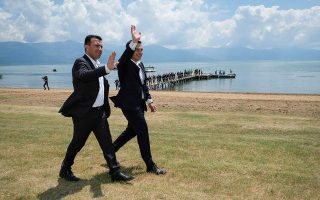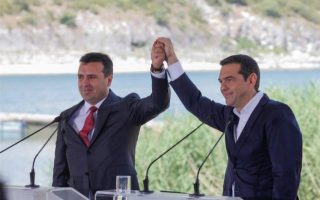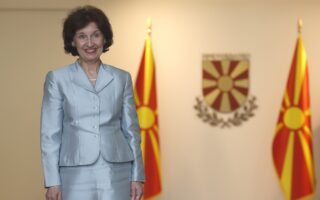Strength through participation: The European Union and its future

In June 2012, while serving as president of the European Commission, I organized a brainstorming session on the future of the euro as the currency of the European Union at the Commission’s headquarters in Brussels, the Berlaymont.
We were still in the midst of the sovereign debt crisis, and I deemed it necessary to convene the chief economists of the largest banks operating in Europe and pose two questions to them.
The first question: Did they think it was possible to keep Greece in the euro? The second: Did they believe that the euro and the Economic and Monetary Union, in its current architecture, could survive the crisis?
Of all those distinguished economists gathered around the table – there were about 12 of them – all but one told me that it would be impossible to keep Greece in the euro. With more or less sophisticated economic analyses and extensively citing the International Monetary Fund, they explained that the so-called debt sustainability analysis showed that it was impossible to avoid Greece’s exit from the euro, and the sooner it happened, the better.
As for the more general question about the future of the Economic and Monetary Union, let’s say opinions were evenly divided. Half of the economists believed that the euro would survive the crisis, while the other half believed it could not remain as it was, or that the eurozone would simply implode. Some even suggested the possibility of two eurozones. It is also public knowledge, as much was written at the time, that this was the shared analysis of many economists, including recipients of the Nobel Prize in economics. The so-called “market sentiment” was that Greece’s exit from the euro (the so-called Grexit) was inevitable and there were great doubts about the future of the European currency itself.
Looking back, we can conclude that most of those economists were utterly mistaken. Just the other day, during a meeting in Athens with Prime Minister Kyriakos Mitsotakis, we recalled those times and evoked this situation and the remarkable progress since then, especially the fact that Greece was named “Country of the Year” by The Economist…
If I recount this episode from 2012, it is because I believe it is important, when analyzing the future prospects of the European Union, to understand where we came from and what lessons we can draw from its past.
I am convinced that the resilience of the European Union is much greater than is usually attributed to it. The truth is that, facing difficulties, the European Union has shown itself capable of overcoming them, although this usually happens in times of crisis, almost on the brink of the abyss.
One might say that the European Union likes to live dangerously, or that it needs that imminent danger to reach decisions that it otherwise cannot make. Indeed, one of the founding fathers of Europe, Jean Monnet, perhaps the one to whom the construction of Europe owes the most due to his political genius (he who was not a professional politician), once said that the European community would be built through crises, and as a series of successive responses to successive crises.
In fact, by its very nature, which has to do with the transnational and “hybrid” character of its institutional construction, combining purely intergovernmental elements with others of a supranational nature, the European Union tends to postpone responses to problems before they reach a special degree of urgency or even drama. The EU is more reactive than proactive, sometimes frustratingly slow and even contradictory in its decision-making process. It is typically incrementalist in its approach to problems and in preparing positions on them. Instead of far-reaching decisions, it seeks to take things step by step, usually through a policy of small steps, although there are situations that require, here and there, a larger step.
That was what happened in the sovereign debt crisis, a period that I experienced intensely at the Commission. There was much initial resistance from the member-states (especially those in a position to provide a satisfactory response to the crisis), and only later, practically on the brink of the abyss, was there a willingness to consider more far-reaching measures. It was thus, in response to this financial crisis, that what was previously considered impossible became possible: for example, rescue programs for countries in difficulty, including Greece, Portugal, Ireland and others, which were insolvent or on the verge of insolvency.
These programs, I want to remind you, were considered at the time by many as legally incompatible with the treaties, but they were necessary, and reality ended up imposing their inevitability. The creation of the ESM, the European Stability Mechanism, the launch of European supervisory mechanisms, notably with enhanced powers for the European Central Bank – I recall that my Commission presented more than 30 legislative proposals towards new financial supervision and regulation, legislative pieces whose approval would have been inconceivable before the financial crisis – all this political and normative response took shape incrementally but also decisively and structurally. It should be noted, however, that unfortunately some of this legislation has not yet been passed, such as deposit guarantee mechanisms, which were envisaged as one of the pillars of the so-called Banking Union, a proposal I had the opportunity to make on behalf of the Commission at the time.
One might say that the European Union likes to live dangerously, or that it needs that imminent danger to reach decisions that it otherwise cannot make
Similarly, and more recently, when the pandemic struck, it became possible to do what was not foreseen in the European treaties, namely joint procurement of vaccines by the Commission. As is known, the European Union has merely residual competences in the field of public health. This is essentially a responsibility of the member-states, but faced with the pandemic crisis and its severity, it was possible for the Commission to step in for the member-states in this joint procurement of vaccines, and significant steps are now being taken towards a European Health Union.
Even more significant was the fact that, in response to the economic situation arising from the pandemic, and to create the NextGenerationEU program, the various countries finally agreed to a form of debt mutualization and gave the Commission a mandate to raise in the markets 800 billion euros on their behalf.
It should be remembered that similar proposals made during the financial crisis were categorically rejected by the so-called frugal countries. I myself and several others proposed Eurobonds at the time as a way to restore market confidence in the eurozone. But, like many others, it was an idea initially rejected but made its way: The mutualization of some debt would finally be accepted, notably by Germany, which had said just a few years earlier that this would never happen.
In the same way, when Russia invaded Ukraine, the European Union was able – in addition to generally showing considerable unity in support of Ukraine – to overcome some taboos, such as buying military equipment and ammunition. Something that would also have been unthinkable before a war like the one Putin’s Russia launched against Ukraine, which poses a truly existential challenge to Europe.
We are thus seeing the European Union leaving what I have called its geopolitical adolescence and reaching a certain level of strategic maturity, also advancing in the progressive construction of a European security and defense identity (although, of course, seeking to do so without contradiction with NATO). In other words, it is in the face of difficulties, often of an external nature, that the European Union advances in its own process of internal integration.
The examples above demonstrate that Europe has “memory” and that, in a state of crisis and emergency, it is capable of “learning” and drawing lessons from previous situations.
The question now arises as to whether this will happen in the future. Obviously, we don’t have the ability to predict the future, but we can analyze the strong trends that are already emerging. These trends are pushing towards accentuating and accelerating the external challenges facing the European Union. This means placing European countries in a situation where only together can they defend their values and interests.
Size matters. European scale is necessary. As a Belgian politician said many years ago, in Europe, all countries are small. It’s just that some haven’t realized it yet. When we compare these countries, including the largest ones, France and Germany (but also the United Kingdom, although it is no longer a member of the EU), with the United States of America or China, and even with Russia regarding its nuclear arsenal, we see that individually considered, European countries are far from the premier league of global influence.
At the various G20 summits I had the opportunity to attend, it was clear that at that forum – undoubtedly the most important in terms of articulating economic and political power on a global scale – those who really matter around the table are primarily the United States, China and, if presented united, Europe, which is represented not only by some of its largest countries but also by European institutions. The European Union is now, indeed, although many Europeans and external analysts are not aware of it, one of the three poles of power worldwide. Certainly, lacking some coherence and consistency, particularly in terms of defense, the EU cannot project the same power as those who have not only the capabilities but also the will to do so in that domain. However, considering its economic, commercial and financial centrality and scale, it’s easy to recognize that the EU constitutes an indispensable pole of power and influence on the global stage.
European unity is indeed necessary. And, to make possible what is necessary is the main role of politics. True and enlightened leadership is needed. At the European and national levels. Our border is Europe, and only within that framework will the Europeans be able to protect and promote their interests and values.
Jose Manuel Barroso is former prime minister and foreign affairs minister of Portugal and served as the president of the European Commission from 2004 to 2014.





